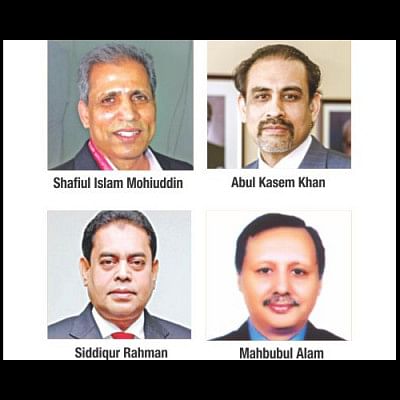VAT rate too high

Chamber leaders and business community welcomed the government's plan to raise infrastructure spending, but criticised the 15 percent VAT, saying the rate is exorbitant and will dent business confidence.
In their instant reactions, the chamber leaders said, in the proposed budget for fiscal 2017-18 many of their expectations have been addressed, while many others have been excluded.
Some positives of the proposed budget are that the finance minister has kept many basic commodities out of the purview of the 15 percent VAT and proposed good strategies to improve the much needed infrastructure, said Shafiul Islam Mohiuddin, president of the Federation of Bangladesh Chambers of Commerce and Industry (FBCCI), in his reaction.
However, the flip side is that many small enterprises have been included in the purview of the 15 percent VAT, he added. This is a matter of concern as those small enterprises do not have the financial capacity to pay that amount of VAT.
The VAT rate should be much lowered for the small enterprises so that those units can run well, he said.
“If the government can execute the proposed budget properly, I think the country would be benefited,” Mohiuddin said.
The government can implement the Annual Development Programmes by borrowing money from the banks; it would not be a wrong decision to do so, he added.
However, the government should maintain a regular inflow of money in the markets, so that investment is not hampered due to bank borrowing by the government, he said.
To mitigate the deficit, the government plans to borrow Tk 28,203 crore from the banking sector, but it should keep in mind that the move will not negatively affect borrowing by the private sector, said the chief of the apex trade body.
Another good side of the budget is that the government did not withdraw supplementary duties as a whole. Rather, it proposed to continue supplementary duties on some products that will eventually protect the domestic industries.
However, the government should implement the Special Economic Zones (SEZs) as soon as possible so that the inflow of both local private investment and foreign direct investment increase in the national economy, he said.
“I am very happy that the government prioritised infrastructure in the budget. This move will help attract investment, which we need to generate jobs and economic development,” said Abul Kasem Khan, president of Dhaka Chamber of Commerce and Industry (DCCI).
The subsidy for LNG imports will boost the confidence of the businessmen. On 15 percent VAT, the DCCI chief said it is much higher than their expectation.
The proposed hike in gas supplies to the industrial units and implementation of the SEZs will reduce the hassle of the investors, he said.
The DCCI will discuss the VAT rate issue further at a joint press conference to be held on Saturday in Dhaka. The meet is expected to be held at FBCCI, where leaders of DCCI, Bangladesh Garment Manufacturers and Exporters Association, Bangladesh Knitwear Manufacturers and Exporters Association, and other chambers will speak, he added.
Siddiqur Rahman, president of BGMEA, said the government should reduce the source tax at zero percent as the garment sector has been passing through a bad time. The finance minister reduced the corporate tax of garment factories to 15 percent from 20 percent at present.
Rahman demanded a reduction in the corporate tax at 10 percent and cash incentives at five percent for at least the next two years so that the sector can face the challenges of falling export, stemming from a volatile global economy.
The garment sector has been witnessing a little over 13 percent growth over the last 10 years, but the growth declined to less than 3 percent in recent months due to a global outlook of volatile economies, he said.
“The next two years are crucial for us. We need government policy support to maintain even moderate growth. We will face even tougher competition as some competing countries have already been given support from their governments to strengthen apparel exports,” Rahman said.
Fazlul Hoque, a former president of BKMEA, said the difference in the corporate tax for the garment factories and green garment factories should be at least five percent.
The finance minister reduced corporate taxes for the garment sector to 15 percent from an existing 20 percent, and to 14 percent for the green units.
So, the difference is only one percentage point. Factory owners would feel encouraged to set up more green units if the corporate tax is reduced further for them, which will save more energy and water, he said.
KM Rezaul Hasanat, chairman and CEO of Viyellatex Group, and Miran Ali, managing director of Bitopi Group, who run green garment units, welcomed the move.
Our correspondent from Chittagong said Mahbubul Alam, president of Chittagong Chamber of Commerce and Industry, criticised the government for keeping the 15 percent VAT rate unchanged in the budget.
Alam proposed the rate at 10 to 12 percent. He also condemned the government for increasing the turnover tax from 3 percent to 4 percent; he suggested fixing it at 3 percent so that small entrepreneurs can benefit from it.
In the proposed budget, the excise tax has been increased to Tk 800 from Tk 500 for deposits from Tk 1 lakh to Tk 10 lakh in the banks; it will discourage people from keeping deposits in the banks, he said.
Alam, however, praised the government for some important projects in Chittagong, including building an elevated expressway from Lalkhan Bazar to Chittagong Shah Amanat International Airport and the expansion of the rail line from Dohazari to Ghundhum.

 For all latest news, follow The Daily Star's Google News channel.
For all latest news, follow The Daily Star's Google News channel. 



Comments